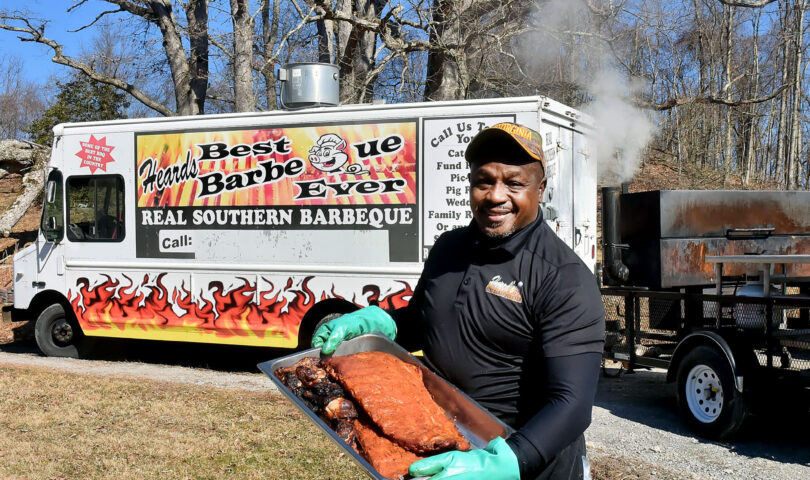Grappling with 1,000 pounds of beef, as Charlie Heard is wont to say, isn’t easy.
Even if he was smiling about it the whole time.
“Oh, man,” he said, with a rub of humor in his voice.
“Working hard and getting it done, brother. Counting our blessings.”
The barbecue, too.
Getting it done and counting your blessings: call that a business model and mantra for Heard, 61, a former standout collegiate wrestler and Olympic hopeful whose signature barbecue and soul food offerings will win the gold every time, his many clients say.
He’s known across West Virginia and up and down the Eastern Seaboard for his “Heard’s Best BBQ Ever” catering business.
If you’re planning an event and you want something beyond the standard pasta and chicken, Heard’s your man.
If you’re a restaurant owner looking for that item your customers will ask for without even looking at the menu, Heard’s who you call.
Weddings, birthday parties and other events. Festivals.
Tasty barbecue and brisket, just like he learned to do back home.
Collard greens, and a signature six-cheese mac and cheese that can make whole tables swoon.
Wings. Pulled-pork and chicken sandwiches.
“It’s ‘soul food-comfort food,’” he said. “I think we’re starting to get known.”
For sure.
No beef at all — with the way it worked out
The above-mentioned 1,000 pounds of the “Heard’s Best BBQ Ever” product was being shipped to clients in Orlando, Fla.
A similar order was being prepared for New Jersey.
Call 304-692-9665 to find out what he can do for you. The business also has its own Facebook page and Instagram, to make it even easier.
It wasn’t always easy growing up in LaGrange, Ga., a working-class town of 30,000 about an hour south of Atlanta, but young Charlie never really fixated on that as a kid — even if he did live in a four-room house with six siblings.
What’s that? Four bedrooms? No. Four rooms, period. His father was a sharecropper.
“We were the poorest family in town, but we didn’t know we were,” he said.
That’s where Heard discovered wrestling, the Greco-Roman kind. He played baseball and football and he was good, but the on the wrestling mat, he excelled.
Quickness and leverage are the two cornerstones of that sport. Heard employed both, and he kept pinning opponents, even if he was 5-foot-5 and pipe-cleaner thin.
“I was never big or strong, but I was fast,” he said.
Colleges with serious wrestling programs came calling to LaGrange.
Heard went on to be a three-time NCAA All-American at the University of Tennessee-Chattanooga, and wrestled in Russia, Cuba and other mats around the globe, far away from his Georgia hometown in his reach for the Olympics.
Wrestling brought him to West Virginia, in fact.
Nate Carr, also a star grappler, was working as an assistant wrestling coach at WVU to supplement his own Olympic goals.
He and Heard struck up a friendship during an international competition in Sweden.
“Nate said, ‘Charlie, come train with me in Morgantown. You’ll love the place.’ And he was right.”
Heard, meanwhile, was an alternate on the U.S. team for the 1984 Summer Games and narrowly missed the Olympics four years later in ’88, after a heart-breaking injury in the final rounds of the trials.
He returned to his adopted hometown — to fall back on barbecue.
Barbecue was always going in the backyard in LaGrange, he said. He wasn’t exactly knee-high to a spatula when he first started taking his turn, but he was a kid who did grow up at the grill.
“I started doing barbecue when I was still down South to raise money for the Olympics,” he said. “I thought people might like it. I hoped they would.”
A restaurant led to a food truck — you can roll up to it in the warm months — which, in turn, begat his catering business.
“We’re here for you,” he said.
He’s not just talking barbecue.
‘I’ll take it, brother’
A few years back, a shriek roused him out of his recliner at the end of a long work day.
“I remember saying to my daughter, ‘That sounded blood-curling. Somebody’s hurt.’”
A woman was sobbing and staggering in the street in front of his house. She was bleeding from her face.
An argument with her male companion escalated to violence. The man held her at knifepoint before she was able to wrangle herself away.
He threw the knife, striking her in the face. Thankfully, the wound wasn’t as bad as it looked initially, but there was still all that blood.
Heard gathered her up tight, scanning the street the whole time, while other neighbors called 911.
He didn’t know if the attacker was going to double-back around. He didn’t know if there was a gun, or another knife. He didn’t care.
Another neighbor was so moved by the unconditional act — Heard is Black and the woman he rescued is white — that she wrote a letter to The Dominion Post, chronicling the events.
“You know, I never saw that as a ‘black and white’ thing,” he said. “I never even thought about it. It’s never about pigment for me. She needed help.”
With the pandemic, he hasn’t been able to witness it as much as he used to, but he loves it when he sees people of all stripes, sitting shoulder-to-shoulder, enjoying a meal he and his co-workers prepared for them.
Besides the menu, there’s the humanity, he said.
Might that mean making for a better world … through barbecue?
“I’ll take it, brother. I’ll take it.”
TWEET @DominionPostWV




